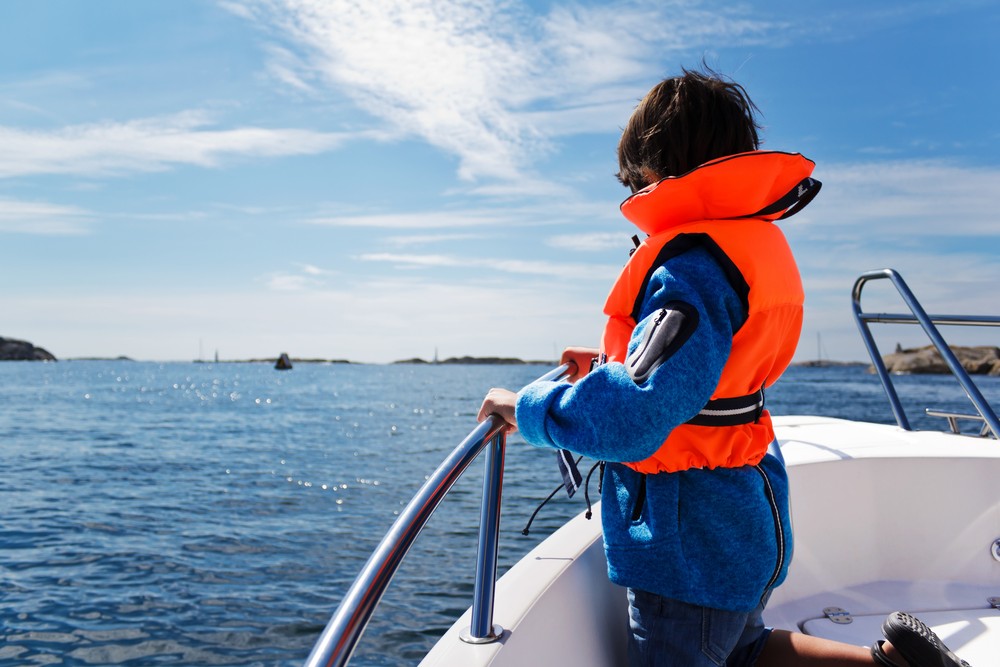The Boat Stop is temporarily pausing operation and is no longer accepting any new transactions.

Nothing quite matches the thrill and
enjoyment of spending a day out on the water. Whether you're with friends,
family, or you're sailing solo, boating offers an endless array of
possibilities to have fun! However, one thing to always keep in mind is safety. Let's explore 10 boating safety tips
to help you stay safe on the water!
Our first tip is to always wear a
personal flotation device (PFD) while on the water. This is especially true if
you are going out alone or with inexperienced boat operators, as even veteran
boaters can find themselves in danger when faced with unexpected situations. It
is important to remember that no matter how good of a swimmer you are, it can
be difficult to stay afloat in rough waters or when weighed down by clothing or
equipment.
It is essential that everyone completes a
boating safety course, regardless of their previous experience. Whether you are
new to boating or have been operating boats for years, these courses will
always have something to teach you! Make sure to check your state's regulations
regarding safe boating courses, as some states require operators to take a
class in order to legally operate a vessel.
Another important boating safety tip is
to always check the weather and water conditions before taking your vessel out.
High winds, choppy waters or storms can make for a dangerous situation, so it's
critical to stay informed about what you're getting yourself into. Checking the
forecast ahead of time can help you plan accordingly and avoid putting yourself
in any hazardous situations. Additionally, it is important to be mindful of
tides and currents. If you are in an area with strong tidal patterns, make sure
to plan your route accordingly to avoid mishaps.
On the water, it's best to prepare for
the unexpected. That's why we recommend keeping a boat safety kit onboard with
you at all times. Here are some essential items your safety kit should include:
●
Flashlight – A flashlight and extra batteries
can help you see around your boat in the dark
●
Duct tape – This can be used to temporarily
hold things in place or even bandage any
leaks.
●
First aid kit – A properly equipped first aid
kit is essential.
●
Whistle – A waterproof whistle can be used to
signal for help in case of emergency.
●
Ropes – Critical to help save someone who
falls overboard.
●
Mirror – A mirror or any reflective object can
signal for help.
Alcohol contributes to nearly 1 in every
5 boating accidents — why take the chance? Operating a vessel while under the
influence of alcohol is not only dangerous, but it is also illegal. It's best
to avoid any alcoholic beverages while operating or riding in a boat.
Each time you take your boat out, always
perform a safety check. Verify the fuel and oil levels, inspect all lights and
electronics, make sure batteries are charged, check the anchor and line, and
inspect all life jackets. Additionally, it is best practice to have a professional
mechanic inspect your boat annually in order to avoid any major maintenance
mishaps on the water.
It can be tempting to stay glued to our
cell phones, especially when we are away from the mainland and want to stay
connected. However, it is important to remember that your attention should be
focused on the water and not your phone. Texting while operating a boat can put
yourself and others in danger, so make sure to stay off your devices while you
are on the water.
Creating a float plan is a wise safety
precaution that can come in handy during an emergency. Always let someone know
where you are going and when you plan to return. This can help your loved ones
keep track of your route and any changes, as well as inform them if you do not
make it back on time.
It's always a good idea to have a
co-captain on board your vessel. This person should know just as much about the
boat as you do so they can help you with tasks such as navigation and
watch-keeping, and can also take the helm if you become tired or need a break.
Finally, the most important boating
safety tip is to stay alert and attentive. You never know what might come up on
the water, so it's essential to stay vigilant and keep your eyes peeled for any
potential hazards. Additionally, limiting distractions like loud music or phone
calls can also help prevent accidents from occurring.
Boating is a great activity to enjoy with
friends and family, but safety should always be a top priority. By following
these 10 boating safety tips, you can have peace of mind that you and your
passengers will have an enjoyable time.
If you're looking for your next vessel,
come check out The Boat Stop!
We're a one-stop marketplace that connects boat buyers and sellers to
facilitate a seamless buying process. Made by boaters for boaters, we cater to
vessels of all shapes and sizes. Happy boating!